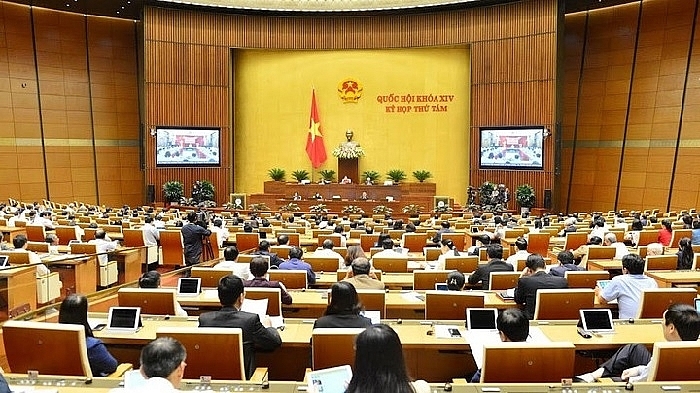 |
|
National Assembly deputies give voice as law on PPP takes shape (illustration photo)
|
The National Assembly (NA) officially put a minimum revenue guarantee in the draft Law on Public-Private Partnerships (PPP) up for discussion at the hall last week, marking the first time a law in Vietnam would allow the state to commit to sharing revenue risks with private parties, who had been expecting it for years.
NA deputy Tran Van Tien representing the northern province of Vinh Phuc said that risk allocation is necessary to attract investors, but that some issues that should be taken into consideration.
“The rate of sharing revenue risk must be specific for each sector to ensure transparency. The source of funding for revenue risk allocation should also be clarified to ensure feasibility,” Tien said.
Other deputies made their voices heard. Nguyen Kim Tuyen, representing the Mekong Delta province of Tien Giang, proposed that in the case of the actual revenue of a project being lower than the amount agreed in the concession contract, the authorised state agency should clarify objective factors.
“Clause 2 of the draft law’s Article 77 regulates the government may consider paying up to 50 per cent of the difference between the actual revenue of the project and the amount agreed in the concession contract. If the scheme turns a profit, PPP ventures should share at least 50 per cent of the difference for projects approved by the NA and the government,” Tuyen suggested.
Meanwhile Nguyen Thi Le Thuy, NA deputy of the Mekong Delta province of Ben Tre province said, “We offer regulations on project tenders with transparency in information and selection of contractors, thus enabling businesses to ensure careful consideration before making the decision to join,” Thuy said. “Therefore, the revenue risk allocation should take into account objective factors related to natural disasters, or subjective factors related to state changes of planning, regulations, and supporting policies.”
The Mekong Delta region’s An Giang province deputy Mai Thi Anh Tuyet said lessons from countries like South Korea that have successfully developed PPP projects show that minimum revenue risk sharing is important in order to lure investment in infrastructure development.
“However, this mechanism should not be offered to all PPP projects as regulated in Clause 2 of Article 77. It should give priority to mammoth projects with long investment return and huge objective risks such as those in transport and other sectors,” Tuyet stated.
The minimum revenue guarantee is considered one of the most positive changes in the draft law on PPP, with it becoming a bottleneck to the country’s private investment attraction in infrastructure development for years.
Thus far, transport has proved to be the most vulnerable to the lack of the mechanism in prevailing laws. The sector, therefore, has remained less attractive to international ventures, with one historical example of PPP failure being the Dau Giay-Phan Thiet expressway project. The venture, which requires investment capital of $757.7 million, has been awaiting implementation for over a decade.
Vietnam is currently carrying out eight PPP sections of the VND118.7 trillion ($5.16 billion) Eastern Cluster of the North-South Expressway, but it has attracted wavering attention. As a result, the country has had to pivot towards domestic investment.
Other sectors including healthcare, education, and infrastructure development are also facing similar challenges. Domestic private and international investors are looking at how Vietnam can create a desired law on PPP to seek further opportunities.
Also on the NA agenda, deputies came forward with different ideas about other concerns among businesses in the draft law.
Deputy Tien from Vinh Phuc agreed with the limit of PPP projects to some key sectors and large-scale projects as mentioned in the draft law. He is still worried though, about the flexible regulation on extending to other needy sectors when necessary. However, Deputy Pham Van Hoa representing the Mekong Delta province of Dong Thap had different ideas, commenting that the seven fields of PPP investment may be insufficient.
In terms of investment scale of relevant projects, many NA deputies voiced disagreement, saying that the fixed minimum capital of VND200 billion ($8.69 million) is not suitable.
NA deputy Do Thi Lan from the northeastern province of Quang Ninh, cited development of PPP projects in her own province as an example. Quang Ninh is home to many kinds of PPP schemes such as build-own-operate and operate-manage. Many of them are worth less than VND200 billion ($8.69 million), and even those worth VND20 billion ($869,000) prove effective. “Thus, the regulation of the proposed minimum capital in the draft could hinder PPP development in healthcare, education, sports, the environment, and others in remote areas,” Lan said.
Nguyen Chi Dung, Minister of Planning and Investment which directly compiles the draft law, stated that there have been varying comments on the big issues, explaining that the limitation of PPP development results from lower attractiveness of investment in some sectors like education, healthcare, and entertainment. For minimum revenue risk allocation, this mechanism will not be applied commonly, but on extremely important projects. VIR
Tung Anh

National Assembly debates draft law on PPP
Most National Assembly (NA) deputies agreed on the need for the draft Law on Public-Private Partnership to finalise a legal framework of this type of investment and improve the effectiveness of long-term public-private partnership (PPP) projects.

Transformation ahead in PPP investment risk mechanisms
Long-standing concerns could be solved in the latest version of the draft Law on Public-Private Partnerships ahead of National Assembly discussions.
 The National Assembly has officially voiced support for the revenue risk sharing mechanism in the long-awaited draft Law on Public-Private Partnerships, but worries persist over feasible conditions, state budget affordability, and project scale.
The National Assembly has officially voiced support for the revenue risk sharing mechanism in the long-awaited draft Law on Public-Private Partnerships, but worries persist over feasible conditions, state budget affordability, and project scale.